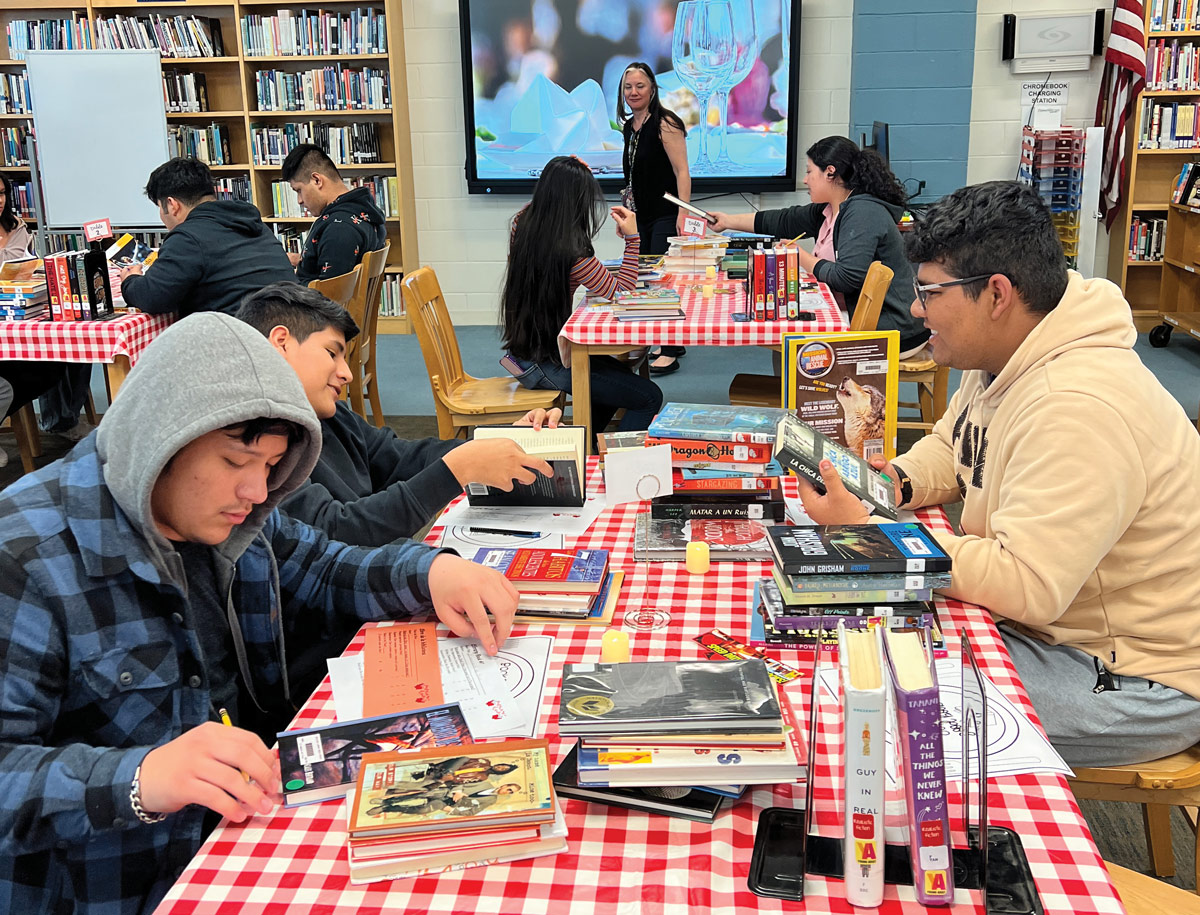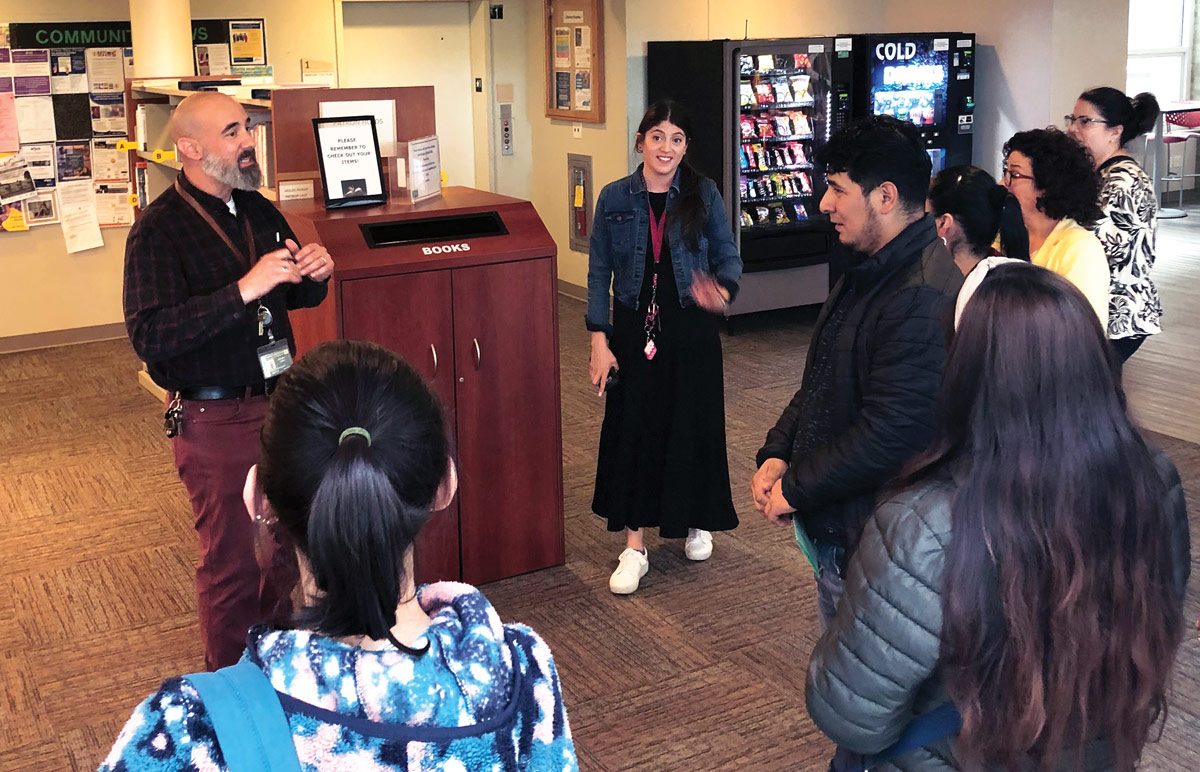Educator Workshops Help English Language Learners Succeed
A series of professional learning workshops partners school librarians with English language teachers from the same school district to develop programs that support ELLs and their families.
 |
A Book Speed Dating event at Westlake High School in Thornwood, NY, organized by Westlake’s former library media specialist, Mary Knopp, and English as a new language teacher, Karyn Palladino.Photo by Mary Knopp |
Sometimes the best teaching partnerships happen by chance. For me it began one day when I was working as a school librarian at Pocantico Hills School in Sleepy Hollow, NY. The English as a new language (ENL) teacher, Joy Scantlebury, came into the library seeking a quiet space to work with her students. Over the next few months, I got a peek into Joy’s impact on these kids. Though I knew these English language learners (ELLs) from my library classes, I had been missing out on getting to know them as well as I could. I also realized that as a school librarian, I could do more to support their learning and sense of belonging and that collaborating with Joy could help me do that most effectively.
Joy and I started working together in a variety of ways, and we decided to create a special end-of-year celebration for our students. The idea was to recognize their achievements and place in our school and global community. For the first-year celebration, we invited the ELLs to bring their lunch to eat with us in the library. Joy put together tote bags filled with library books, word puzzles, and other small fun items to promote their literacy skills over the summer.
The next year we asked the PTA for support to buy food and dessert for the party. We added decorations, certificates of achievement, and a slideshow featuring all our students. Joy led a country “shout-out” and put up a poster with flags from each student’s country. Later, she added a world map showing the countries’ locations.
Every aspect of the event grew over the next few years, and soon students were excitedly asking about it as soon as they returned to school in September. We invited special guests, including administrators, classroom teachers, fellow students, and families of our current ELLs. Joy also invited ELLs who had graduated to come back and speak.
Also read: From Job Exploration to Geography, AR and VR Lift Student Learning
My work with Joy provided inspiration when I started a new job in 2022 at the School Library System of Southern Westchester (NY) BOCES. I started working closely with two resource specialists at the Hudson Valley Regional Bilingual Education Network, Vanessa Gulfo and Christine Olsen. We developed a series of professional learning workshops, “The Dynamic Duo.” The series is designed to bring together school librarians and English language teachers from the same school district as teaching teams to develop programs to support ELLs and their families.
It kicked off in 2022–23, with teams from 12 school districts signing up. The teams met and worked together in person a few times throughout the year. Most duos were school librarians and ENL teachers, but some included public librarians and other classroom teachers. Over the course of the sessions, we helped each team build an event or initiative to be completed before the end of the school year. At our final session, each team presented to the group to share ideas for future planning.
It has been amazing to see what the teams have done. The Dynamic Duo model has been quickly embraced by many school librarians and English language teachers, and they have run with it. Here are suggestions for building your own program.
5 Key ResourcesGetting Started with Culturally Responsive Teaching |
Know each other’s roles
Before the teams began collaborating, we decided it was important for school librarians and English language teachers to learn more about each other’s areas of expertise. Vanessa and Christine met with school librarians to inform them about what English language teachers do, while I met with English language teachers. Then we talked about what each group had to offer to support ELLs.
Our school librarians said it was helpful to learn more about what ELL instruction entails, and the English language teachers told me they were glad to hear more about the resources and technology tools that their school librarians could offer. Both groups gained a better appreciation of how valuable it could be to combine expertise in support of ELLs and their families.
Understand that ELLs are a vast, diverse group
A starting point for the series has been learning more about who our ELLs are. Here are some of the key things to know:
• Although some students may be newly arrived from other countries, the majority of ELLs were born in the United States, according to the Migration Policy Institute.
• There tend to be more ELLs in the younger grade levels, because students who are identified as ELLs when they first start school often become proficient speakers when they reach upper grade levels, according to U.S. Department of Education statistics.
• While the term ELL is applied to many students in a school, there are many subgroups, just as there are many different types of students in general. In New York State, ELL subgroups include: newcomers, developing ELLs, long-term ELLs, ELLs with disabilities, students with interrupted/inconsistent formal education, and former ELLs, according to the New York State Education Department (NYSED).
Adopt a culturally responsive mindset
Exploring the facts and figures about ELLs is helpful, but it’s just a tiny part of what educators need to know to have a full picture of these students. This is where exploring the idea of a culturally responsive mindset becomes important.
The Cultural Iceberg is a concept first introduced by Edward T. Hall in his 1976 book, Beyond Culture. The idea is that when we meet someone, there are aspects that we can see, such as the clothing they wear, the food they eat, the music they listen to, etc. There are also aspects that are not visible, including rules of conduct and interaction and attitudes toward elders, for example. It can be much easier than we believe it is to misread one another’s behaviors because of cultural assumptions. For this reason, it becomes critical to approach our students with a mindset that is culturally responsive.
Culturally responsive teaching is a term that is applicable to all educators. The NYSED has created a Culturally Responsive-Sustaining Education Framework that includes these four principles:
• Welcoming and affirming environment
• High expectations and rigorous instruction
• Inclusive curriculum and assessment
• Ongoing professional learning
The guidelines were established to “...support education stakeholders in developing and implementing policies that educate all students effectively and equitably, as well as provide appropriate supports and services to promote positive student outcomes,” according to the NYSED.
In other words, the goal is to support all students, including ELLs, so they can grow as learners and become confident individuals who recognize their place in the school community and beyond.
 |
A group visits the Greenbugh (NY) Public Library during a Books, Burgers, Backpacks event.Photo courtesy of Valhalla Union Free School District |
Build a successful partnership with these tips
After reviewing these topics, we identified the key requirements of any successful partnership. They include:
• Mutual respect. Each team member must recognize and appreciate their partner’s expertise.
• Communication. Being open, honest, and respectful are vital for productive communication.
• Commitment. Each team member must be fully invested and participate consistently.
• A plan of action. To achieve a goal, team members must agree on a game plan to get there. This involves mapping out all of the steps, assigning tasks, setting deadlines, and creating checkpoints along the way.
We created a planning template that teams could use to organize their ideas. In addition to the who, what, when, and where, we asked the groups to think about these questions:
• Who else might be willing to support your initiative?
• How will you engage participants?
• Who else will you invite to attend?
• How will you document and promote your event?
• How will you gather feedback from attendees?
• How will you sustain your initiative over time?
Workshop participants shared that answering these questions before starting the work made it much less daunting to get their project launched.
Enjoy and celebrate
It has been thrilling to see what the teams have created. Here are a few highlights:
“Book Speed Dating” was the name of a well-received event held at Westlake High School in the Mt. Pleasant Central School District. The school librarian and English language teacher set up a book “café” with tablecloths, soft music, and an array of new books (in multiple languages) that they recently added to the library collection. Students were invited to come in to circulate among the tables and take time to browse all the choices before selecting the book they wanted.
Another team from Valhalla Union Free School District developed a multiday program for ELLs and their families called “Books, Burgers, Backpacks.” On the first day of the program, students made a special trip to the public library with their school librarian and English language teacher. During this visit, they completed a scavenger hunt activity designed to help them become familiar with the public library. After, students got to have lunch at a nearby Burger King, a fun occasion that made the day even more memorable. This was followed by a special evening program, where students and their families were invited to the public library to learn about all the programs and resources available.
Keep track of the ripple effect
One of the best parts of this series has been seeing the ripple effect of these workshops. One librarian workshop participant told me that because of the high turnout at the event held jointly with the public library, there was a dramatic jump in attendance at the public library’s summer programs. The increase was so great that the public library planned to expand its offerings next summer.
Our workshop teams have shown how powerful a teaching partnership can be. They have each come up with unique ideas, yet all have a shared objective: to help ELLs and their families feel seen and supported in their schools and their communities.
Anne Price-Gordon has recently accepted a new role as head of children’s services at a public library.
RELATED
The job outlook in 2030: Librarians will be in demand
The job outlook in 2030: Librarians will be in demand
ALREADY A SUBSCRIBER? LOG IN
We are currently offering this content for free. Sign up now to activate your personal profile, where you can save articles for future viewing





Add Comment :-
Be the first reader to comment.
Comment Policy:
Comment should not be empty !!!